28 Jun 2016
New collaborations and funding opportunities within Space sector
Having been awarded funds from the UK Space Agency to support local early-stage space sector companies, the iNet team in the Enterprise Office is keen to hear from academics whose work would be relevant to the UK Space Incubator.
Benefits to academics include the potential for new collaborations, student projects and raised profile and prize funding from international competitions. Current opportunities include a number of calls for good business ideas making use of satellite data: ESNC Challenge, Copernicus Masters and NASA Europa Challenge.
The UK Space Incubator aims to create a thriving local cluster of commercial ventures ranging from pre-start ups to growing space companies and academics working in a range of different sectors linked to the space sector; upstream (infrastructure and technology); downstream (direct space services) and the wider space economy (space-enabled value-added applications).
Profiles of a number of companies and academics have been published on a webpage on the Science and Enterprise Park website, together with the support available to companies, which could include space in the Advanced Technology Innovation Centre.
If your research could be of relevance, please email Pauline Graham. The range of potential research areas, technologies and applications is huge. For example:
- Unmanned Aerial Vehicles
- Disaster and Emergency Response Management
- Big Data and the Internet of Things
- Autonomous vehicles
- Intelligent fuel systems
- Climate & weather related planning & decision support
- Microgravity experiments
- Smart Cities
- People tracking for applications such as assisted living or fitness training
- Tracking the flow of people & goods in and out buildings
- Telematics systems to provide information on driver behaviour and vehicle performance for fuel efficiency/ delivery management
- Opportunities in the upstream infrastructure and technology areas include systems and subsystems, materials, manufacturing processes, and systems integration for spacecraft, satellites and ground support.
- Novel business models for commercialising services and data.















